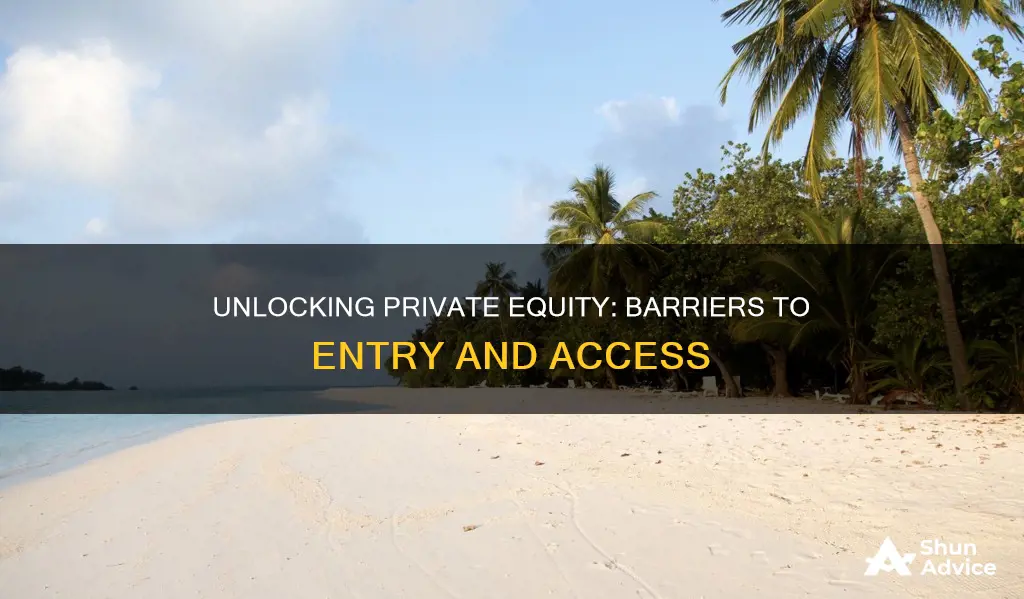
Private equity is a form of investment that takes place outside of the public stock market. It involves investors gaining an ownership stake in private companies. However, private equity investing is not accessible to everyone due to its high minimum investment requirements, typically ranging from a few hundred thousand to several million dollars. As such, most private equity investing is limited to institutional investors or high-net-worth individuals. In addition to meeting the minimum investment requirements, investors must also be accredited, meaning they have a net worth of over $1 million or an annual income of at least $200,000. Private equity investments also tend to be very illiquid, with investors' money often tied up for several years, and they carry high fees and greater risk.
| Characteristics | Values |
|---|---|
| Minimum Investment Requirement | $25 million, though can be as low as $250,000 or even $25,000 |
| High-Risk | Early-stage, high-risk ventures |
| Illiquid | Investments are tied up for several years |
| Transparency Concerns | Lack of access to information and potential conflicts of interest |
| High Fees | Annual management fee of around 2% and 20% of profits |
| High Minimum Investments | $1 million, or $200,000 annual income |
What You'll Learn

High minimum investment requirements
Private equity funds typically require high minimum investments, ranging from hundreds of thousands to several million dollars. The minimum investment in private equity funds is usually around $25 million, although it can sometimes be as low as $250,000 or even $25,000. These high minimum investment requirements make private equity investing inaccessible to most people.
To invest in private equity funds, individuals must be accredited investors, with a net worth of over $1 million or an annual income of at least $200,000. This limits the pool of potential investors to high-net-worth individuals and institutional investors such as pension funds, insurance companies, and university endowments.
The high minimum investment requirements are due to the nature of private equity investing, which involves taking on more risk and investing in early-stage, high-risk ventures. Private equity firms often spend 10-12 years making companies more profitable before selling them or taking them public again. This long time horizon ties up investor capital for several years.
Additionally, private equity firms usually charge high fees, with an annual management fee of around 2% and a performance fee of 20% of the profits. These fees further increase the cost of investing in private equity.
A Guide to Investing in India's Film Industry
You may want to see also

Long investment horizons
Private equity investments are known for their long investment horizons, which can tie up investor dollars for several years. Private equity funds have a finite term of 10 to 12 years, and the money invested in them is typically not available for subsequent withdrawals. The average holding period for a private equity portfolio company was about 5.6 years in 2023.
Private equity firms often spend 10-12 years making companies profitable before selling them or taking them public again to generate returns. This long-term focus gives these investments time to grow. However, it also means that investors need to be prepared to commit their money for at least ten years. If they exit earlier, they may lose out as companies emerge from the acquisition phase, become profitable, and are eventually sold.
Private equity funds work differently from more common fund types like mutual funds in that limited partners typically must commit a set amount of money that the firm can use as needed within a specified period. When the firm requests an investment amount from its investors, it is known as a capital call. For example, a private equity firm may make various investments over a five-year period, calling on its limited partners for capital during that time.
The long investment horizon of private equity also contributes to its high illiquidity. "Illiquid" means that investors cannot easily sell their investments. Most private equity firms aim to stay invested for at least ten years, and many lock up investor funds for at least 5-7 years before they can withdraw their funds. This illiquidity can impact returns, as unforeseen economic events like interest rate changes or recessions may occur during the investment period.
Investment Options for College Savings: What Are Your Choices?
You may want to see also

Illiquidity
Private equity funds work differently from more common fund types like mutual funds, where investors can usually buy and sell shares at any time. In contrast, private equity investors typically must commit a set amount of money that the fund can use as needed within a specified period. This lack of liquidity means that private equity investors face the opportunity cost of the investment returns they could have made elsewhere during the time their money is tied up.
The illiquidity of private equity investments also stems from the nature of the underlying assets. Private equity funds often focus on long-term investments in private companies, including early-stage startups, which may take years to mature and generate returns. Additionally, private equity funds may employ strategies such as buyouts, where they acquire a controlling interest in a company and implement operational and management changes to increase its value before selling it. These processes can take several years, further contributing to the illiquidity of private equity investments.
The high illiquidity of private equity investments is a significant factor in their risk profile. The long time horizons tie up investor capital for extended periods, and unforeseen economic events or market downturns during this time can impact returns. Private equity investments are also less transparent than public market investments, as private companies are not subject to the same strict disclosure requirements as public companies. This lack of transparency can make it challenging for investors to accurately assess the risks and potential returns of private equity investments.
Overall, the illiquidity associated with private equity investments is a critical consideration for investors. It requires a long-term commitment of capital, limiting the flexibility to redeploy funds to other investment opportunities and exposing investors to potential losses if economic conditions change during the investment period.
Tech Innovations: Revolutionizing the Investment Management Game
You may want to see also

Lack of transparency and high risk
Private equity investments are associated with a lack of transparency and high risk. Private equity funds are not registered with the Securities and Exchange Commission (SEC), and thus private equity firms are not required to publicly disclose information about their funds. This lack of transparency means that private investors do not have access to the same level of information as public investors.
The lack of transparency in the private markets is further exacerbated by the complex nature of the industry's principal metrics, the IRR and MOIC, which are inadequate measures of performance. The intransitive properties of the IRR metric, for example, drive opacity by making logical comparisons and rankings inconclusive.
Furthermore, private equity firms are not subject to the same reporting requirements and anti-money laundering obligations as banks, broker-dealers, or retail funds marketed to ordinary investors. This lack of regulation makes the private investment industry vulnerable to illicit financial activities such as money laundering and provides an attractive destination for illicit financial flows. For instance, the opaque nature of private equity obscured the fact that a Russian oligarch owned a majority stake in a US voting management firm.
The high-risk nature of private equity investments is due to the long time horizons, which can tie up investor dollars for several years, and the illiquid nature of the investments. Private equity firms typically aim to stay invested for at least 10 years, and investor funds may be locked up for 5-7 years before they can be withdrawn. Additionally, many PE investments fail to achieve their promised returns, and unforeseen economic events can impact returns.
The combination of high risk and lack of transparency makes private equity investments unsuitable for everyone. These investments are typically reserved for institutional investors or high-net-worth individuals who can absorb potential losses and have the financial means to meet the high minimum investment requirements, often in the million-dollar range.
Indianapolis' East Side: Worth the Investment?
You may want to see also

Only open to accredited investors
Why private equity is only open to accredited investors
Private equity funds are generally only open to accredited investors. This is because private equity firms typically require very high minimum investments, ranging from a few hundred thousand to several million dollars. As such, most private equity investing is reserved for institutional investors (such as pension funds or insurance companies) or high-net-worth individuals.
To be considered an accredited investor, an individual must meet certain criteria regarding income or net worth. Specifically, an accredited investor is someone whose net worth—alone or combined with a spouse—is over $1 million or whose annual income was higher than $200,000 in each of the last two years.
The high minimum investment requirements of private equity funds make them inaccessible to most people. Even when private equity firms have dropped their minimum investment requirements to as low as $25,000, this is still out of reach for many individuals.
In addition to the financial requirements, private equity investing is also restricted to those who are considered knowledgeable fund employees or have certain high-level financial certifications.
These restrictions on who can invest in private equity are in place because private equity is a high-risk and illiquid investment. Private equity firms often focus on long-term investments, with an average holding period of around 5-10 years. This means that investors may have their money tied up for a significant amount of time and may not be able to easily sell their investments if they need to access their funds.
Furthermore, private equity firms are not required to publicly disclose information about their funds, and the companies they invest in are not subject to the same level of regulatory scrutiny as public companies. This lack of transparency and increased risk make private equity investing unsuitable for those who do not have the financial means or knowledge to handle the potential downsides.
Wealth Management Firms: Direct Investment Strategies
You may want to see also
Frequently asked questions
Private equity funds have very high minimum investment requirements, ranging from a few hundred thousand to several million dollars. As such, most private equity investing is reserved for institutional investors or high-net-worth individuals.
Private equity investments are considered high-risk, illiquid, and have high fees.
Private equity investments allow investors to diversify their portfolios and aim for higher returns than they might get from public companies. Private equity valuations are not influenced by the larger market.
Private equity refers to ownership in companies and assets that don't trade publicly. Private equity firms buy and manage companies before selling them for a profit.







